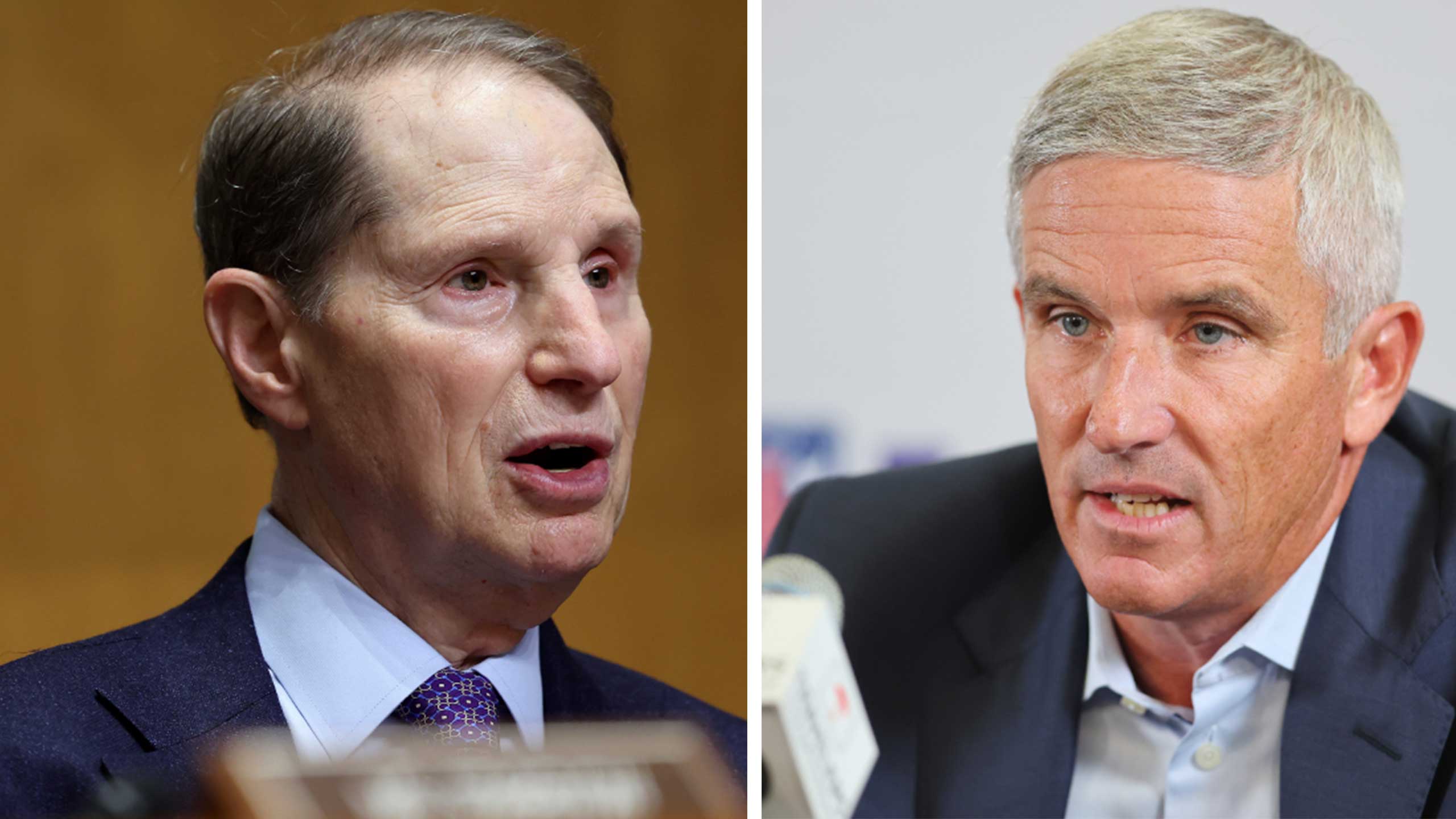
Sen. Ron Wyden, left, is challenging the tax-exemption status of the PGA Tour, which is run by Jay Monahan (right).
getty images
Like a golfer playing an aggressive line, a prominent lawmaker has taken dead aim.
His target: the PGA Tour’s tax-exempt status.
Last week, Sen. Ron Wyden (D-Ore.) introduced legislation that would strip the Tour of the protection it enjoys as a 501(c)6 organization, a designation that provides tax exemptions to trade organizations and professional sports leagues, among other entities.
The bill, presented as “The Sports League League Tax-Exempt Status Limitation Act,” would modify the 501(c)6 criteria to exclude sports organizations with assets exceeding $500 million. Namely, a certain operation based in Ponte Vedra.
If passed into law, Wyden’s proposal would have profound financial implications for the Tour. (According to a 2019 Congressional account, the Tour’s nonprofit status allowed it to skirt $80 million in federal taxes between 2016-2019 alone.)
If being the operative word.
What are the odds of that actually happening?
Just as golf shots can turn in any number of directions, so can legislation. And it’s often hard to know where a bill is headed, especially in the early goings, said Mark Anderson, a golf professional, former Congressional leadership staffer and founder of TAG Consulting Group, a Virginia-based lobbying firm.
“I can tell you this,” Anderson said. “I wouldn’t expect any immediate action.”
For starters, he noted, lawmakers don’t work a wraparound season. Congress is on the cusp of its August recess, “which means that for the next six to eight weeks, (the bill) will sit out there as a subject for discussion, and people will have an opportunity to talk about it,” Anderson said. But not much else.
What will transpire after lawmakers reconvene is tougher to predict. But this much is certain, Anderson said: Interested parties, the PGA Tour included, will do their best to get a gauge of how serious Wyden is about the bill. Given Wyden’s role as the chairman of the Senate finance committee, his name lends the legislation inherent weight, Anderson said.
But lawmakers float bills with all kinds of motivations, Anderson said. Sometimes, they introduce what are known as “messaging” bills, meant to signal leanings on broader issues, or as trial balloons, aimed at testing the political climate.
“If I’m the PGA Tour, I’d be reaching out to Wyden’s office to have a conversation,” Anderson said. “I’d want to know, ‘How carefully have you looked at all of this? Do you understand the potential ramifications if you go too far?’”
This is not the first time the Tour’s tax-exempt status has come up for discussion in Washington.
In 2018, for instance, Sen. Joni Ernst (R-Iowa) introduced what was known as the PRO Sports Act (Properly Reducing Overexemptions for Sports Act), which aimed to revoke the nonprofit status for the league offices of professional sports organizations, singling out in its language the PGA Tour, the LPGA Tour and the National Hockey League. That bill did not pass.
Wyden’s bill comes at a more tumultuous time in professional golf, against the backdrop of a proposed partnership between the PGA Tour and Saudi Arabia’s Public Investment Fund (PIF). In introducing the bill, Wyden made plain his distaste for that controversial deal-in-the-making, saying that any “organization that betrays its own word and agrees to become a profit generator for Saudi Arabia’s brutal regime has disqualified itself for a tax exemption.”
The Tour-Saudi partnership is, of course, far from finalized. It could still come apart, or get squashed by federal regulators, all of which adds other variables into the mix.
In discussing the partnership, the Tour has said that it plans to retain its nonprofit status moving forward. But if Wyden’s bill gains momentum, Anderson said, it could prompt the Tour to voluntarily relinquish its tax exemption, as other large sports leagues, including the NFL, have done.
“Give up your status, and Congress may go away,” Anderson said.
Meantime, the messy work of sausage-making will continue. Passing legislation is a complex and laborious process, requiring approval from both the Senate and the House of Representatives before getting sign off (or not) from the President.
What might come of Wyden’s bill?
One indication of its prospects will the depth of conversation it inspires when Congress reconvenes, said Garrett Watson, senior policy analyst for the Tax Foundation, an independent nonprofit that examines federal, state and global tax policies.
“Does it gain cosponsors? Do they hold hearings and have broader discussions? Those are the some of things I’d be watching,” Watson said.
Another is whether the bill gains bipartisan support, an often elusive feature when it comes to tax legislation, which, Watson said, tends to have “a strong party valence.”
Whatever happens, the bill stands little chance of proceeding to the Senate floor on its own. For it to move forward, Watson said, it would have to be hitched to a larger legislative vehicle, embedded in a broader budget deal or tax package.
When and how that might occur is another matter. As with so much else in golf — and politics— these days, it’s TBD.
“If I had to personally bet, I would be surprised if [the bill] ended up riding on something and passing this year,” Watson said. “But tis’ not out of the realm of possibility.”










